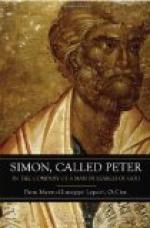Peter couldn’t move. He heard the splintering of glass and a rending of woodwork, some oaths, and a sudden cry. The whirr of an engine filled his ears and seemed, as it were, on top of them. Then there was a crash all but at his side, and next instant a half-smothered groan and a dreadful gasp for breath.
He couldn’t speak. He heard Langton say, “Hit, anyone?” and then Jenks’ “They’ve got me, skipper,” in a muffled whisper, and he noticed that the hard breathing had ceased. At that he found strength and voice and jumped up. He bent over Jenks. “Where have you got it, old man?” he said, and hardly realised that it was himself speaking.
The other was lying just as before, on his back, but he had pulled his knees up convulsively and a rug had slipped off. In a flare Peter saw beads of sweat on his forehead and a white, twisted face.
He choked back panic and knelt down. He had imagined it all before, and yet not quite like this. He knew what he ought to say, but for a minute he could not formulate it. “Where are you hit, Jenks?” was all he said.
The other turned his head a little and looked at him. “Body—lungs, I think,” he whispered. “I’m done, padre; I’ve seen chaps before.”
The words trailed off. Peter gripped himself mentally, and steadied his voice. “Jenks, old man,” he said. “Just a minute. Think about God—you are going to Him, you know. Trust Him, will you? ’The blood of Jesus Christ, God’s Son, saveth us from all sin.’”
The dying man, moved his hand convulsively. “Don’t you worry, padre,” he said faintly; “I’ve been—confirmed.” The lips tightened a second with pain, and then: “Reckon I won’t—shirk. Have you—got—a cigarette?”
Peter felt quickly for his case, fumbled and dropped one, then got another into his fingers. He hesitated a second, and then, put it to his own lips, struck a match, and puffed at it. He was in the act of holding it to the other when Langton spoke behind him:
“It’s no good now, padre,” he said quietly; “it’s all over.”
And Peter saw that it was.
The planes did not come back. The officer in charge of the train came down it with a lantern, and looked in. “That makes three,” he said. “We can do nothing now, but we’ll be in the station in a bit. Don’t show any lights; they may come back. Where the hell were our machines, I’d like to know?”
He went on, and Peter sat down in his corner. Langton picked up the rug, and covered up the body. Then he glanced at Peter. “Here,” he said, holding out a flask, “have some of this.”
Peter shook his head. Langton came over to him. “You must,” he said; “it’ll pull you together. Don’t go under now, Graham. You kept your nerve just now—come on.”
At that Peter took it, and drained the little cup the other poured out for him. Then he handed it back, without a word.
“Feel better?” queried the other, a trifle curiously, staring at him.




